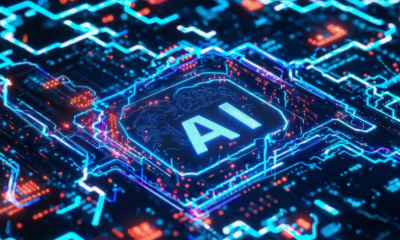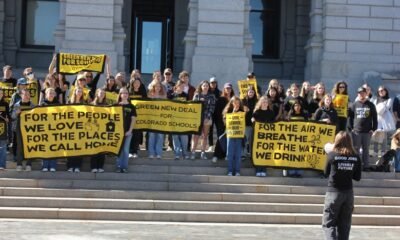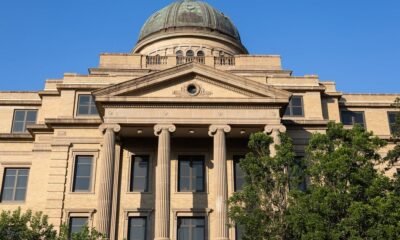Top Stories
Conservative activist Charlie Kirk dead after being shot at Utah university event
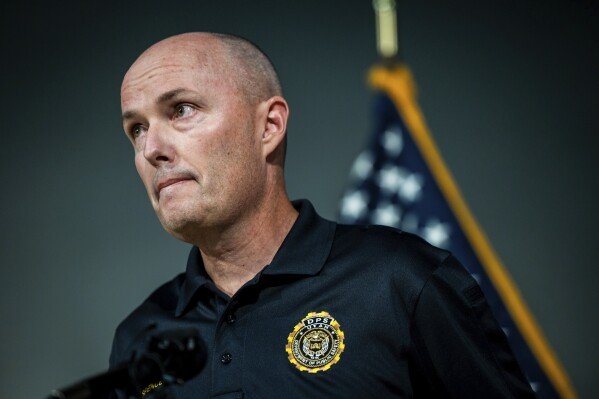
OREM, Utah (AP) — Charlie Kirk, a conservative activist and close ally of President Donald Trump who played an influential role in rallying young Republican voters, was shot and killed Wednesday at a Utah college event in what the governor called a political assassination carried out from a rooftop.
“This is a dark day for our state. It’s a tragic day for our nation,” said Utah Gov. Spencer Cox. “I want to be very clear this is a political assassination.”
No suspect was in custody late Wednesday, though authorities were searching for a new person of interest, according to a law enforcement official familiar with the matter who was not authorized to discuss the situation by name and spoke on condition of anonymity. Two people were detained earlier in the day but neither was determined to have had any connection to the shooting and both have been released, Utah public safety officials said.
Authorities did not immediately identify a motive but the circumstances of the shooting drew renewed attention to an escalating threat of political violence in the United States that in the last several years has cut across the ideological spectrum. The assassination drew bipartisan condemnation, but a national reckoning over ways to prevent political grievances from manifesting as deadly violence seemed elusive.
Videos posted to social media from Utah Valley University show Kirk speaking into a handheld microphone while sitting under a white tent emblazoned with the slogans “The American Comeback” and “Prove Me Wrong.” A single shot rings out and Kirk can be seen reaching up with his right hand as a large volume of blood gushes from the left side of his neck. Stunned spectators are heard gasping and screaming before people start to run away. The Associated Press was able to confirm the videos were taken at Sorensen Center courtyard on the Utah Valley University campus.
People were seen exiting a building on Utah Valley University after Charlie Kirk, the CEO and co-founder of the conservative youth organization Turning Point USA, was shot Wednesday at an event on campus.
Kirk was speaking at a debate hosted by his nonprofit political organization. Immediately before the shooting, Kirk was taking questions from an audience member about mass shootings and gun violence.
“Do you know how many transgender Americans have been mass shooters over the last 10 years?” the person asked. Kirk responded, “Too many.”
The questioner followed up: “Do you know how many mass shooters there have been in America over the last 10 years?”
“Counting or not counting gang violence?” Kirk asked.
Then a single shot rang out. The shooter, who Cox pledged would be held accountable in a state with the death penalty, wore dark clothing and fired from a building roof some distance away to the courtyard where the event took place.
Some 3,000 people were in attendance, according to a statement from the Utah Department of Public Safety, which also said the university police department had six officers working the event along with Kirk’s own security detail.
The death was announced on social media by Trump, who praised the 31-year-old Kirk, the co-founder and CEO of the youth organization Turning Point USA, as “Great, and even Legendary.” Later Wednesday, he released a recorded video from the White House in which he called Kirk a “martyr for truth and freedom” and blamed the rhetoric of the “radical left” for the killing.
AP AUDIO: Conservative activist Charlie Kirk in critical condition after being shot at Utah college event
AP correspondent Haya Panjwani reports on an attack on Charlie Kirk.
Utah Valley University said the campus was immediately evacuated and remained closed. Classes were canceled until further notice. Those still on campus were asked to stay in place until police officers could safely escort them off campus. Armed officers walked around the neighborhood bordering the campus, knocking on doors and asking for information on the shooter.
Officers were seen looking at a photo on their phones and showing it to people to see if they recognized a person of interest.
The event, billed as the first stop on Kirk’s “The American Comeback Tour,” had generated a polarizing campus reaction. An online petition calling for university administrators to bar Kirk from appearing received nearly 1,000 signatures. The university issued a statement last week citing First Amendment rights and affirming its “commitment to free speech, intellectual inquiry, and constructive dialogue.”
Last week, Kirk posted on X images of news clips showing his visit was sparking controversy. He wrote, “What’s going on in Utah?”
The shooting drew swift condemnation across the political aisle as Democratic officials joined Trump, who ordered flags lowered to half-staff and issued a presidential proclamation, and Republican allies of Kirk in decrying the violence.
“The attack on Charlie Kirk is disgusting, vile, and reprehensible,” Democratic California Gov. Gavin Newsom, who last March hosted Kirk on his podcast, posted on X.
“The murder of Charlie Kirk breaks my heart. My deepest sympathies are with his wife, two young children, and friends,” said Gabrielle Giffords, the former Democratic congresswoman who was wounded in a 2011 shooting in her Arizona district.
The shooting appeared poised to become part of a spike of political violence that has touched a range of ideologies and representatives of both major parties. The attacks include the assassination of a Minnesota state lawmaker and her husband at their house in June, the firebombing of a Colorado parade to demand Hamas release hostages, and a fire set at the house of Pennsylvania’s governor, who is Jewish, in April. The most notorious of these events is the shooting of Trump during a campaign rally last year.
Former Utah congressman Jason Chaffetz, a Republican who was at Wednesday’s event, said in an interview on Fox News Channel that he heard one shot and saw Kirk go back.
“It seemed like it was a close shot,” Chaffetz said, who seemed shaken as he spoke.
He said there was a light police presence at the event and Kirk had some security but not enough.
“Utah is one of the safest places on the planet,” he said. “And so we just don’t have these types of things.”
Turning Point was founded in suburban Chicago in 2012 by Kirk, then 18, and William Montgomery, a tea party activist, to proselytize on college campuses for low taxes and limited government. It was not an immediate success.
But Kirk’s zeal for confronting liberals in academia eventually won over an influential set of conservative financiers.
Despite early misgivings, Turning Point enthusiastically backed Trump after he clinched the GOP nomination in 2016. Kirk served as a personal aide to Donald Trump Jr., the president’s eldest son, during the general election campaign.
Soon, Kirk was a regular presence on cable TV, where he leaned into the culture wars and heaped praise on the then-president. Trump and his son were equally effusive and often spoke at Turning Point conferences.
__
Richer and Sherman reported from Washington. Associated Press writers Nicholas Riccardi in Denver and Michael Biesecker, Brian Slodysko, Lindsay Whitehurst and Michelle L. Price in Washington contributed to this report.
Top Stories
Peter Mandelson sacked as US ambassador by Keir Starmer over emails to Jeffrey Epstein
Jaws drop in Westminster, but No 10 insists due process was followedpublished at 10:41 British Summer Time
 Chris Mason
Chris Mason
Political editor
This time last week, there was a drip, drip of revelations about the then-deputy prime minister and calls for her resignation.
Fast forward seven days, and there is a drip, drip of revelations about the UK’s ambassador to the United States and calls for his resignation.
A cabinet minister’s jaw drops when I tell them about the story.
For those who have kicked around at Westminster for a while, there is something familiar about it too.
Peter Mandelson twice lost his job in the cabinet two decades ago over his dealings with rich men.
Mandelson’s friendship with the late Epstein has long been publicly known, so the key political questions are actually for the prime minister, in choosing to appoint him.
Downing Street is not currently providing straight answers when we ask whether these most recent revelations are a surprise to them and whether they know what may be still to come.
They insist “due process” was followed before Mandelson’s appointment.
It would appear that either Downing Street was insufficiently curious or sceptical about the extent of Lord Mandelson’s friendship with Epstein before giving him the job, or calculated that he would be so good in the role it would be worth soaking up any embarrassment the connection might cause them.
Or perhaps they hoped the embarrassing stuff would never come out.
Top Stories
‘The chaos is the point’: tumult as Covid vaccine boosters deployed under RFK Jr | Coronavirus

The first deployment of updated Covid shots under the Trump administration has been plagued by access issues and misinformation amid confusion and chaos at US health agencies.
People attempting to get the vaccines say they have struggled to understand eligibility requirements, book appointments, process insurance claims, battle misinformation from pharmacists and obtain prescriptions from their doctors in some states. Such hurdles will disproportionately affect people of color and low-income people, experts say.
These problems come amid turmoil at US health agencies, with top leaders of the Centers for Disease Control and Prevention (CDC) quitting because of reported pressure from the Trump administration to approve unscientific vaccine policies and new limitations placed on the Covid vaccines.
“Anybody can get the booster,” Robert F Kennedy Jr, secretary of the US Department of Health and Human Services (HHS), said at a hearing before a US Senate committee last week – before adding: “It’s not recommended for healthy people.” In an August post on X, Kennedy said the updated Covid vaccine was approved only for people “at higher risk”.
Matt Shipman, a health writer in North Carolina, was eager to receive an updated shot to protect himself against the acute and long-term risks of a Covid infection, especially as the late-summer Covid wave appears to be reaching its peak.
It used to be easy to schedule an appointment at a pharmacy, but now he received a message saying the vaccines will hopefully be available in a few weeks. He had heard some people were getting prescriptions for the shots, but when he called his doctor’s office, they wouldn’t even make an appointment for a prescription.
North Carolina is one of several states where pharmacists are requiring prescriptions before administering any shots.
In some states, pharmacists are prevented by law from administering vaccines that are not recommended by the CDC’s advisory committee on immunization practices (ACIP). While doctors have liability protections for Covid vaccines under the Public Readiness and Emergency Preparedness (Prep) Act, pharmacists may not if the vaccines are not approved by the advisory committee.
Some insurers might also opt not to cover the shots until they are recommended.
The independent advisers are expected to take up Covid recommendations at the next meeting in mid-September, but that meeting has been embroiled in controversy. Senator Bill Cassidy, a Republican from Louisiana, called for an indefinite postponement given the recent upheaval at health agencies.
Shipman said: “It’s incredibly frustrating, because this has significant consequences for public health, and there is no reason in the world for this to be happening.
“It is an entirely manufactured problem that is going to cost people their health and wellbeing and possibly their lives. It is manifestly clear that people who would like the Covid vaccine are not able to access it.”
Changing the rules to make vaccination easier will depend on the state, said Lindsay Wiley, a professor of law and faculty director of the health law and policy program at UCLA Law.
“In several states, governors and health officials are solving the prescription problem pretty swiftly, so it’s a rapidly evolving situation right now. In other states, the legislature may need to take action to fix the problem,” Wiley said.
Even states that have tried to combat the confusion still have vaccine challenges. The state of Maryland released guidance last week for all residents to access vaccines – without specifying the need to disclose qualifying conditions. Maryland’s governor, Wes Moore, called the federal changes to vaccine policy “harmful for Marylanders and all Americans”.
Yet when Ian Morgan tried to obtain the vaccine in Maryland, the pharmacist said it could only be administered to those over the age of 65 or people with at least one underlying health condition. Morgan tried to make an appointment online, but was told CVS couldn’t schedule his appointment because he did not qualify.
Morgan, a postdoctoral fellow at the National Institutes of Health and a union steward of NIH Fellows United-UAW 2750, said the tumult has been caused by Kennedy’s messaging on vaccines.
“I think the chaos is the point, and that chaos has consequences,” Morgan said. “Creating this confusion, creating this chaos, trying to discredit scientific experts – and we see that every time [Kennedy] goes out there – that in and of itself is causing problems, and that in itself is harming the American people.”
Morgan is one of 1,000 current and former HHS employees who signed a letter calling for Kennedy’s resignation.
Vaccine availability for children, especially for those under the age of five, has lagged even further behind adults as pediatricians struggle to understand new limitations and potential legal risks.
Joanne Hilden, a retired physician, has been searching for the updated vaccines for her four grandchildren, who are between the ages three and 12, in Minnesota. The local health department, where the youngest two kids were vaccinated in 2021, is only offering vaccines for adults over the age of 65. Pharmacies have not received the pediatric doses yet.
There are also immense structural barriers that make it harder for marginalized people to access the shots.
Julia Lynch, a professor of political science at the University of Pennsylvania, first made plans to get vaccinated in Oakland, New Jersey, a 45-minute drive from her home in Philadelphia, before the state board of pharmacy gave pharmacies the go-ahead to vaccinate Pennsylvanians.
The CVS pharmacies near her home had no appointments, so she ended up driving to a predominantly white suburb.
“I don’t know why it is that the vaccines are getting to those CVSes first,” she said. But that means “if you’re Black or Latino, you are less likely than if you’re white to live close to someplace where you can get a vaccine”.
after newsletter promotion
The population of Oakland, for example, is 80% white and had appointments – but neighboring Camden, New Jersey, had no appointments, and its population is 3.5% white.
Transportation is another major issue. Traveling to Oakland by public transit would have taken more than two hours on three buses and one regional train.
“Eligibility right now is obviously limited to people who are over 65 or who have at least one medical condition that puts them at high risk,” Lynch said. “These are exactly the people who are most likely to have trouble traveling four-plus hours on a multimodal public transit journey to get their Covid shot.”
Not everyone has reliable internet access, the technological knowledge to book appointments, or the ability to take time off work or find childcare to locate and travel to appointments.
“For people who are not chronically online, it’s a major undertaking to do all this,” Lynch said.
Fighting to have the shots covered by insurance, or paying out of pocket for the uninsured, is another major hurdle, she said.
Rachel, who lives in Pittsburgh and asked to be identified by her first name to protect her health history, has two autoimmune disorders and a genetic blood clotting disorder that puts her at high risk if she gets sick with Covid. She said she would like to get the latest Covid shot, but is planning to wait for a few weeks.
“The challenges right now for me are just around information, and actually knowing what is the truth and what is going to happen if I try to get it,” she said. She said she had heard of people being turned away from pharmacies even after the Pennsylvania vaccine announcement.
“It just sounds like it’s still a shitshow. It’s still challenging to make an appointment here, so I’m going to wait a little bit.”
Rachel said it reminded her of 2021, when many people scrambled to get their first Covid shots.
“It’s just frustrating to me that based on absolutely zero evidence, and in some cases, just making up lies about evidence, [the] HHS has just decided these are so dangerous that we need to limit them,” she said.
Sarah, who lives in Westchester county, New York, and asked to be identified by her first name so she is not harassed by anti-vaccine activists, said she was finally able to get the shot after days of effort.
In New York, she needed a prescription. That later changed when Kathy Hochul, the governor, opened up access to all New Yorkers.
The faxed prescription never went through, so her health system had to set up an electronic prescription system. Sarah asked that her doctor prescribe any Covid vaccine; she said she overheard the pharmacist denying one prescription because it was for the Pfizer vaccine and they only had Moderna.
Even after the prescription was received, the pharmacist said he needed verbal confirmation from the doctor by phone as well.
Sarah said she paid $250 out of pocket, and has since spent hours on the phone with her insurance company to be reimbursed. After she paid, the pharmacist tried to dissuade her from getting the shot, Sarah said.
“Do you really know what you’re getting into? This is brand new,” she recalls him saying. She responded: “I know – that’s why I want it.” But he told her they “don’t know anything” about the updated vaccines and “we don’t know what’s gonna happen” to her once she received it, she said.
The roadblocks were “wearing me down”, Sarah said. “It’s trying to make it inaccessible, impossible, confusing.”
Shipman in North Carolina was dogged in his search, even looking at appointments in other states. Eventually, he was able to receive the vaccine at an urgent care center.
But not everyone is able to track down the vaccine and overcome these obstacles, Lynch said. “It’s really hard for ordinary people who are very busy and not necessarily paying close attention to this to know what they’re supposed to do to keep themselves or their loved ones safe.”
Top Stories
South Korea says detained Korean workers released from Georgia facility before flight home
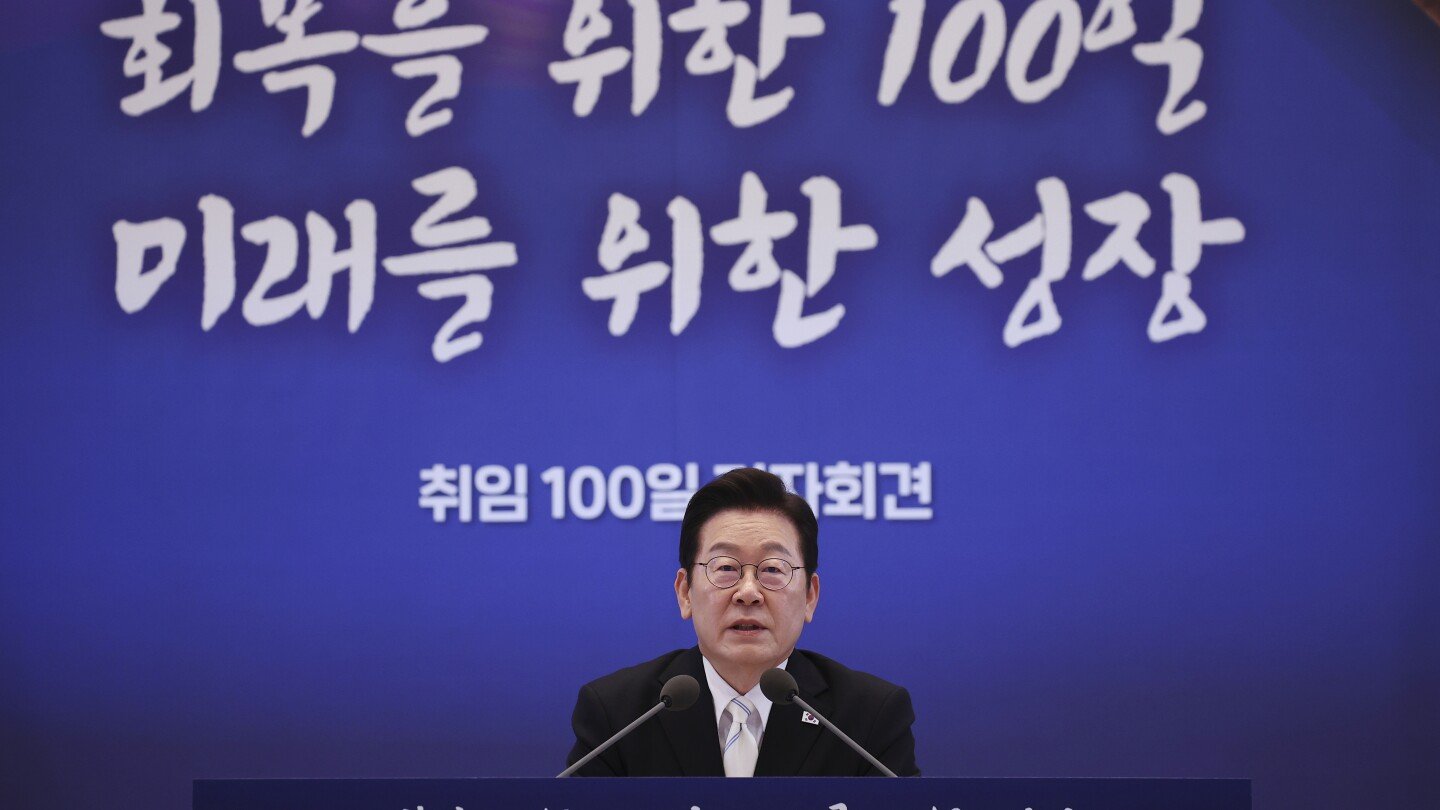
SEOUL, South Korea (AP) — South Korea’s president said Thursday that Korean companies will likely hesitate to make further investments in the United States unless Washington improves its visa system for their employees, as U.S. authorities released hundreds of workers who were detained from a Georgia factory site last week.
In a news conference marking 100 days in office, Lee Jae Myung called for improvements in the U.S. visa system as he spoke about the Sept. 4 immigration raid that resulted in the arrest of more than 300 South Korean workers at a battery factory under construction at Hyundai’s sprawling auto plant west of Savannah.
South Korea’s Foreign Ministry later confirmed that U.S. authorities have released the 330 detainees – 316 of them Koreans – and that they were being transported by buses to Atlanta’s Hartsfield-Jackson airport where they will board a charter flight scheduled to arrive in South Korea on Friday afternoon. The group also includes 10 Chinese nationals, three Japanese nationals and one Indonesian.
The massive roundup and U.S. authorities’ release of video showing some workers being chained and taken away, sparked widespread anger and a sense of betrayal in South Korea. The raid came less than two weeks after a summit between U.S. President Donald Trump and Lee, and just weeks after the countries reached a July agreement that spared South Korea from the Trump administration’s highest tariffs — but only after Seoul pledged $350 billion in new U.S. investments, against the backdrop of a decaying job market at home.
Lawmakers from both Lee’s liberal Democratic Party and the conservative opposition decried the detentions as outrageous and heavy-handed, while South Korea’s biggest newspaper compared the raid to a “rabbit hunt” executed by U.S. immigration authorities in a zeal to meet an alleged White House goal of 3,000 arrests a day.
During the news conference, Lee said South Korean and U.S. officials are discussing a possible improvement to the U.S. visa system, adding that under the current system South Korean companies “can’t help hesitating a lot” about making direct investments in the U.S.
Lee: ‘It’s not like these are long-term workers’
U.S. authorities said some of the detained workers had illegally crossed the U.S. border, while others entered legally but had expired visas or entered on visa waivers that prohibited them from working.
But South Korean officials expressed frustration that Washington has yet to act on Seoul’s yearslong demand to ensure a visa system to accommodate skilled Korean workers, though it has been pressing South Korea to expand U.S. industrial investments.
South Korean companies have been mostly relying on short-term visitor visas or Electronic System for Travel Authorization to send workers who are needed to launch manufacturing sites and handle other setup tasks, a practice that had been largely tolerated for years.
Lee said that whether Washington establishes a visa system allowing South Korean companies to send skilled workers to industrial sites will have a “major impact” on future South Korean investments in America.
“It’s not like these are long-term workers. When you build a factory or install equipment at a factory, you need technicians, but the United States doesn’t have that workforce and yet they won’t issue visas to let our people stay and do the work,” he said.
“If that’s not possible, then establishing a local factory in the United States will either come with severe disadvantages or become very difficult for our companies. They will wonder whether they should even do it,” Lee added.
Lee said the raid showed a “cultural difference” between the two countries in how they handle immigration issues.
“In South Korea, we see Americans coming on tourist visas to teach English at private cram schools — they do it all the time, and we don’t think much of it, it’s just something you accept,” Lee said.
“But the United States clearly doesn’t see things that way. On top of that, U.S. immigration authorities pledge to strictly forbid illegal immigration and employment and carry out deportations in various aggressive ways, and our people happened to be caught in one of those cases,” he added.
South Korea, US agree on working group to settle visa issues
Following a meeting with U.S. Secretary of State Marco Rubio in Washington, South Korean Foreign Minister Cho Hyun said Wednesday that U.S. officials have agreed to allow the workers detained in Georgia to later return to finish their work at the site. He added that the countries agreed to set up a joint working group for discussions on creating a new visa category to make it easier for South Korean companies to send their staff to work in the United States.
Before leaving for the U.S. on Monday, Cho said more South Korean workers in the U.S. could be vulnerable to future crackdowns if the visa issue isn’t resolved, but said Seoul does not yet have an estimate of how many might be at risk.
The Georgia battery plant is one of more than 20 major industrial sites that South Korean companies are currently building in the United States. They include other battery factories in Georgia and several other states, a semiconductor plant in Texas, and a shipbuilding project in Philadelphia, a sector Trump has frequently highlighted in relation to South Korea.
Min Jeonghun, a professor at South Korea’s National Diplomatic Academy, said it’s chiefly up to the United States to resolve the issue, either through legislation or by taking administrative steps to expand short-term work visas for training purposes.
Without an update in U.S. visa policies, Min said, “Korean companies will no longer be able to send their workers to the United States, causing inevitable delays in the expansion of facilities and other production activities, and the harm will boomerang back to the U.S. economy.”
-

 Business2 weeks ago
Business2 weeks agoThe Guardian view on Trump and the Fed: independence is no substitute for accountability | Editorial
-
Tools & Platforms1 month ago
Building Trust in Military AI Starts with Opening the Black Box – War on the Rocks
-

 Ethics & Policy2 months ago
Ethics & Policy2 months agoSDAIA Supports Saudi Arabia’s Leadership in Shaping Global AI Ethics, Policy, and Research – وكالة الأنباء السعودية
-

 Events & Conferences4 months ago
Events & Conferences4 months agoJourney to 1000 models: Scaling Instagram’s recommendation system
-

 Jobs & Careers2 months ago
Jobs & Careers2 months agoMumbai-based Perplexity Alternative Has 60k+ Users Without Funding
-

 Podcasts & Talks2 months ago
Podcasts & Talks2 months agoHappy 4th of July! 🎆 Made with Veo 3 in Gemini
-

 Education2 months ago
Education2 months agoVEX Robotics launches AI-powered classroom robotics system
-

 Education2 months ago
Education2 months agoMacron says UK and France have duty to tackle illegal migration ‘with humanity, solidarity and firmness’ – UK politics live | Politics
-

 Funding & Business2 months ago
Funding & Business2 months agoKayak and Expedia race to build AI travel agents that turn social posts into itineraries
-

 Podcasts & Talks2 months ago
Podcasts & Talks2 months agoOpenAI 🤝 @teamganassi








